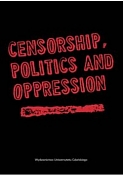Censorship
Politics and Opression
There are various kinds of censorship, but most often this term is connected with some
kind of political tense and oppression. However, many important intellectual or artistic
movements have developed under censorship in various countries over the years. So does
censorship have a positive or negative influence on people’s work and creation? Do
people become more creative or intellectually fertile when they are oppressed in some way?
In recent years – as it is often said – democracy throughout the world has seemed to
collapse, and various political forces (e.g. ISIS or pro-Russian unrest in Ukraine) have
oppressed people. Those who have decided to comment on current political situations have
been punished for their words (as the journalists of Charlie Hebdo), and those who have
broken national or political taboo have been incarcerated (as the members of a Russian
feminist band Pussy Riot). When we live in such times, we start to think about the past
– comparing it to presence – and ask ourselves numerous questions: Where does the
freedom end, and where does the oppression start? What can we do to prevent such
situations? How can we live under censorship and political oppression?
This book includes approaches both of experienced scholars and of young academics at the
start of their careers, as well as doctoral students. Due to its interdisciplinary nature,
this publication brings many interesting observations on and discussions about the role of
censorship in the past and in the present-day world.
Introduction
.
7
LITERATURE AND ART | 9
Sondeep Kandola
(Self)Censorship and Salomé: Oscar Wilde’s European Gambit 11
Sihem Arfaoui
In the Name of “Order” and the Poetics of the Black Marker in Shahriar Mandanipour’s
Censoring an Iranian Love Story: A Novel . 21
Karolina Drozdowska
Books on Trial: Norwegian Law against Pornography in Literature (Mykle and Bjorneboe Cases
of 1957 and 1967) . 49
Aleksandra Cieslar
Art as Political Statement: The Phenomenon of Banksy’s Street Art . 65
Anusuya A Paul
Resisting Political Oppression Destabilising Communal Frontiers: Rabijita Gogoi’s
Theatre versus Insurgency in Assam, India . 77
JOURNALISM, PRESS AND OTHER MEDIA | 85
Magdalena Buchowska
East StratCom Task Force: EU Fight against Fake News 87
Michał Przeperski
Is It Possible to be a Journalist without Censorship?
Polish People’s Republic Journalism before and after 1956 99
Natalia Olszewska
When Can We Start Talking about Censorship? Poland in the British Press in the 1930s
. 109
THE VARIOUS FACES OF CENSORSHIP | 125
Christopher “Irish Goat” Knodel
Censorship, Politics and Oppression: Jan Tschichold—A Case Study in New Typography
127
Tomasz Mróz
Polish Studies on Plato under the Oppression of Censorship: Lutosławski—Lisiecki—Witwicki
. 137
Alicja Skrzypczak
The Misinformation Effect as a Form of Censorship
in the Process of Creating Migrant Identity: Migrant Memory and Ontological Security
149
162 pages, Paperback
Księgarnia nie działa. Nie odpowiadamy na pytania i nie realizujemy zamówien. Do odwolania !.


